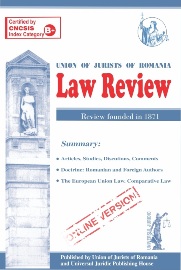THE DUBLIN III REGULATION: CRITIQUES AND LATEST ATTEMPTS OF REFORM
THE DUBLIN III REGULATION: CRITIQUES AND LATEST ATTEMPTS OF REFORM
Author(s): Camilla CafieroSubject(s): Law, Constitution, Jurisprudence, Civil Law, EU-Legislation, Asylum, Refugees, Migration as Policy-fields
Published by: Universul Juridic
Keywords: Amendment; application; asylum; Commission; competence; cooperation; Council; criteria; deficiencies; discretion; Dublin system; Parliament; European; family unit; first entry; foreigner;
Summary/Abstract: The Dublin III Regulation is the latest European law instrument that defines the system with which the Member State responsible for examining an application for international protection is determined. Despite the important improvements made to the previous legislation, the Regulation is still an instrument suspended between new and old, which on the one hand responds to the innovations of the European Union in the field of asylum, but on the other hand, is not able to meet the new requirements remaining attached to cases that are over twenty years old. The European Commission, in 2016, issued a proposal for a reform of the Dublin system. But, once again, instead of rethinking the fundamentally incorrect principles underlying the European Union's mechanisms, the proposed amendments reinforced many of the wrong premises. On 16 November 2017, then, the European Parliament, in examining the first reading of the Commission's proposal, adopted numerous amendments, eliminating or improving some of the controversial points of the text. However, the agreement between the European Parliament and the Council, imposed by the ordinary legislative procedure, will be difficult to achieve. The discussions under way in the Council since 2016 and not yet ended are totally disconnected from the Commission proposal and the Parliament amendments. Member States, in fact, are aiming for solutions to prevent solidarity from becoming mandatory and leaving everything in the hands of the Council. It is not clear whether the European Institutions will find a compromise in order to improve the Dublin System or will opt for the establishment of new regulations with different premises and principles.
Journal: Law Review
- Issue Year: 2019
- Issue No: 01
- Page Range: 2-22
- Page Count: 21
- Language: English
- Content File-PDF

